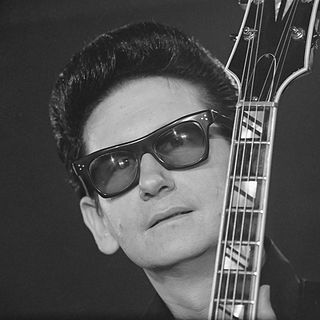
Roy Kelton Orbison was an American singer, songwriter, and guitarist known for his distinctive and powerful voice, complex song structures, and dark, emotional ballads. Orbison's music is mostly in the rock music genre and his most successful periods were in the early 1960s and the late 1980s. He was nicknamed "The Caruso of Rock" and "The Big O". Many of Orbison's songs conveyed vulnerability at a time when most male rock-and-roll performers projected machismo. He performed with minimal motion and in black clothes, matching his dyed black hair and dark sunglasses.
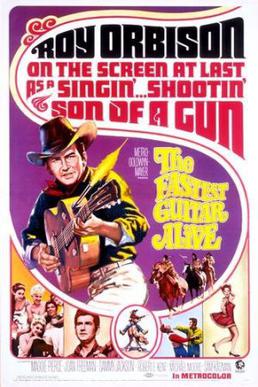
The Fastest Guitar Alive is a 1967 American musical comedy Western film, directed by Michael D. Moore with singer Roy Orbison in his only starring role as an actor.
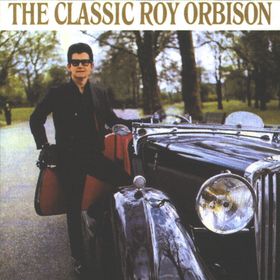
The Classic Roy Orbison is the ninth studio album recorded by Roy Orbison, and his third on the MGM Records label, released in July 1966. The single taken from it, "Twinkle Toes", would be Orbison's last US top-forty single during his lifetime, scraping in at #39. It also reached #24 in Australia and #29 in the UK, The album was successful in The UK, where it spent for 8 weeks on the album chart there at number 12.
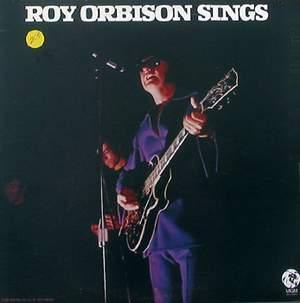
Roy Orbison Sings is the sixteenth album recorded by Roy Orbison and the ninth for MGM Records, released in May 1972. Around this time, Orbison's hit singles had well and truly dried up, but this album is said to be one of his finest.
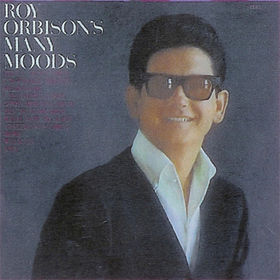
Roy Orbison's Many Moods, also known as The Many Moods of Roy Orbison, is the thirteenth album recorded by Roy Orbison, and his seventh for MGM Records, released in May 1969. It included two singles, both of which were minor hits in the UK: "Heartache" at number 44, and "Walk On" at number 39.

There Is Only One Roy Orbison is the seventh album recorded by Roy Orbison, and his first for MGM Records, released in July 1965. It features his studio recording of "Claudette", an Orbison-penned song which had become a hit for The Everly Brothers in 1958. Ironically, at the time he recorded the song in 1965, he had divorced his wife Claudette, who had inspired the lyrics. Orbison later re-recorded the song for In Dreams: The Greatest Hits in 1985. The single taken from the album was "Ride Away", which reached no. 25 in the US charts, no. 12 in Australia and no. 34 in the UK. Cash Box described "Ride Away" as a "rhythmic teen-angled ode about a somewhat ego-oriented lad who cuts-out on romance."
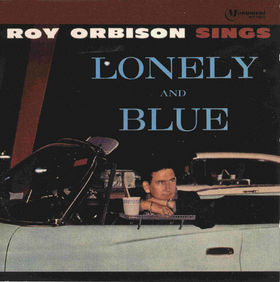
Lonely and Blue is the debut studio album by Roy Orbison, released on Monument Records in January 1961.

Memphis is the seventeenth album recorded by Roy Orbison, and his tenth for MGM Records. The album was released in November 1972.

The Orbison Way is the eighth album recorded by Roy Orbison, and his second for MGM Records, released in January 1966. Two singles were taken from the album—"Crawling Back" and "Breakin' Up Is Breakin' My Heart"—both of which were chart hits in England, the US and Australia.

Roy Orbison Sings Don Gibson is a tribute album recorded by Roy Orbison for MGM Records. Released in January 1967, it is a collection of songs written by Country Music Hall of Fame singer/songwriter Don Gibson who, like Orbison, often wrote about the loneliness and sorrow that love can bring. Its one single, "Too Soon to Know", became a smash hit in the UK, reaching #3 there in September 1966, and also reached no. 4 in Ireland and no. 27 in Australia. In Canada, the song only reached no. 71.

Cry Softly Lonely One is the twelfth music album recorded by Roy Orbison, and his sixth for MGM Records. The album was released in October 1967 and included two singles: "Communication Breakdown" and the title tune, both of which were minor hits in the States early that year. "Communication Breakdown" did much better in Australia, where it reached #9 in February. According to the official Roy Orbison biography, the London Records release of this album featured the extra track "Just One Time".
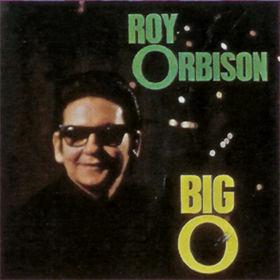
The Big O is the fifteenth music album recorded by Roy Orbison, and according to the authorised Roy Orbison biography, his second for London Records in the United Kingdom. The music and backing vocals were provided by English group, the Art Movement on all tracks except for "Penny Arcade", which was a studio recording and was released as a single in 1969, peaking at No. 27 in the UK and was Orbison's last UK chart success during his lifetime. "Penny Arcade" was also his biggest hit in Australia, spending four weeks at number one around Christmas 1969. The second single, "Break My Mind", was Orbison's last Australian chart success during his lifetime, reaching #24 in March 1970. The album was released in Europe in early 1970.

The Great Songs of Roy Orbison is an album recorded by Roy Orbison for MGM Records released in the United States in February 1970.

Hank Williams: The Roy Orbison Way is the fourteenth album recorded by Roy Orbison, and the eighth for MGM Records, released in August 1970. It is a tribute album to the songs of Country Music Hall of Fame honky tonk singer Hank Williams, whom Orbison listed among his influences. The album was a critical failure and it sold poorly—Fred Foster said it was "an exercise in futility." The exclusively North America release remained relatively unknown to Orbison fans until it was repackaged on Compact Disc in 2009 along with the popular 1967 Don Gibson tribute album Roy Orbison Sings Don Gibson. The album was also included in the 2015 box set The MGM Years 1965–1973 – Roy Orbison.
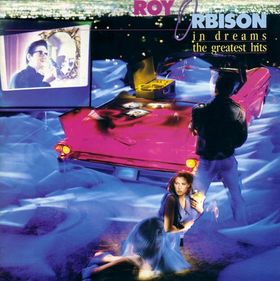
In Dreams: The Greatest Hits is a two-record album set by Roy Orbison songs released in 1987 on Virgin Records. It was produced by Orbison and Mike Utley, except for the song "In Dreams", produced by Orbison with T-Bone Burnett and film director David Lynch. All songs are re-recordings by Orbison from 1986, except "In Dreams" from April 1987.
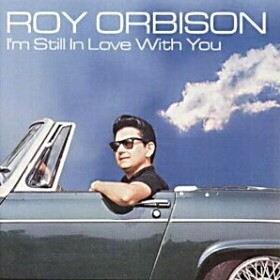
I'm Still in Love with You is the nineteenth album by Roy Orbison, recorded for Mercury Records and according to the authorised biography of Roy Orbison, released in September 1975.
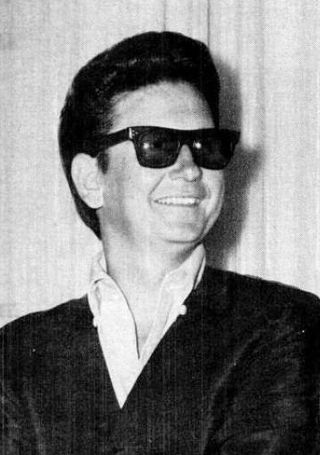
Roy Orbison was an American singer-songwriter who found the most success in the early rock and roll era from 1956 to 1964. He later enjoyed a resurgence in the late 1980s with chart success as a member of the Traveling Wilburys and with his Mystery Girl album, which included the posthumous hit single "You Got It". At the height of his popularity, 22 of Orbison's songs placed on the US Billboard Top 40 chart, and six peaked in the top five, including two number-one hits. In the UK, Orbison scored ten top-10 hits between 1960 and 1966, including three number-one singles.

The Essential Glen Campbell Volume Three is the third of a series of three albums which cover Glen Campbell's recordings for Capitol Records from 1962-79. The tracks are presented in a non-chronological order. All three Essential CDs contain, next to single and albums tracks, previously unreleased recordings. On The Essential Glen Campbell Volume Three, these are "Beautiful Brown Eyes", "They'll Never Take Her Love from Me", "All the Way" and "Learnin' the Blues". The last two songs are from a 1979 recording session led by Nelson Riddle. The Essential albums are also notable for containing some of the songs from The Artistry of Glen Campbell, the only original studio album by Campbell that has not been released on CD or as a digital download. Included here is "Tequila".

Hey, Little One is the eighth album by American singer-guitarist Glen Campbell, released in 1968 by Capitol Records. The single "I Wanna Live" became Campbell's first number-one hit on the country charts.
"Run, Baby Run " is a song written by Joe Melson and Don Gant and performed by The Newbeats. It reached #4 in Canada, #12 on the Billboard Hot 100, and #66 in Australia in 1965. The song was also released in the United Kingdom as a single, but it did not chart on its original release. The group re-released the song as the B-side to their 1971 single, "Am I Not My Brother's Keeper", and in that year, "Run, Baby Run " reached #10 in the U.K., following extensive playing in Northern Soul clubs in England.



















